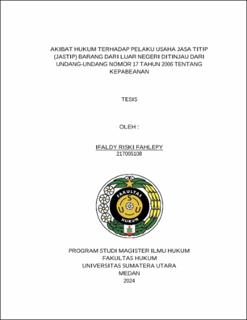| dc.contributor.advisor | Sunarmi | |
| dc.contributor.advisor | Azwar, Tengku Keizerina Devi | |
| dc.contributor.advisor | Robert | |
| dc.contributor.author | Fahlepy, Ifaldy Riski | |
| dc.date.accessioned | 2025-02-24T02:57:08Z | |
| dc.date.available | 2025-02-24T02:57:08Z | |
| dc.date.issued | 2024 | |
| dc.identifier.uri | https://repositori.usu.ac.id/handle/123456789/101598 | |
| dc.description.abstract | The booming entrustment service business is developing in Indonesia, which
in practice provides significant profits so that it is popular with many groups. This
research focuses on analyzing regulations for apparel entrustment (jastip) service
businesses from abroad, with the aim that in the future the practice of goods
entrustment (clothing) service businesses can obtain regulations related to the rules
for purchasing goods or business permits from the government.
This research is normative legal research and empirical legal research with a
statutory approach. The data used is primary data and secondary data consisting of
primary, secondary and tertiary legal materials collected using library research
techniques. All data was analyzed using qualitative data analysis methods.
Based on this research, it is concluded that the regulations for apparel
entrustment (jastip) service businesses from abroad are Law no. 17 of 2006
concerning Customs, Minister of Finance Regulation no. 203/PMK.04/2017
concerning Provisions for the Export and Import of Goods Carried by Passengers
and Crew of Transport Facilities, as well as Regulation of the Minister of Finance
No. 199/PMK.010/2019 concerning Customs, Excise and Tax Provisions on Imported
Goods. Sanctions against apparel entrustment (jastip) service businesses who violate
Law no. 17 of 2006 concerning Customs, namely in Article 102B of Law Number 17
of 2006 concerning Customs, the criminal threat is imprisonment for a minimum of 5
(five) years and a maximum imprisonment of 20 (twenty) years. The role of the
Directorate General of Customs and Excise in the widespread practice of jastip
apparel in Indonesia is by carrying out supervision. The form of supervision carried
out by Customs and Excise is through systems, x-ray baggage analysis, and
passenger profile analysis. | en_US |
| dc.language.iso | id | en_US |
| dc.publisher | Universitas Sumatera Utara | en_US |
| dc.subject | Businessmen | en_US |
| dc.subject | Entrustment Service | en_US |
| dc.title | Akibat Hukum Terhadap Pelaku Usaha Jasa Titip (JASTIP) Barang dari Luar Negeri Ditinjau dari Undang-Undang Nomor 17 Tahun 2006 tentang Kepabeanan | en_US |
| dc.title.alternative | The Legal Effects on Goods Delivery Services (JASTIP) Business Activities from Overseas Are Reviewed from Law Number 17 Of 2006 about Customs | en_US |
| dc.type | Thesis | en_US |
| dc.identifier.nim | NIM217005108 | |
| dc.identifier.nidn | NIDN0015026304 | |
| dc.identifier.nidn | NIDN0001027001 | |
| dc.identifier.nidn | NIDN0013079201 | |
| dc.identifier.kodeprodi | KODEPRODI74101#Ilmu Hukum | |
| dc.description.pages | 110 Pages | en_US |
| dc.description.type | Tesis Magister | en_US |
| dc.subject.sdgs | SDGs 16. Peace, Justice And Strong Institutions | en_US |


